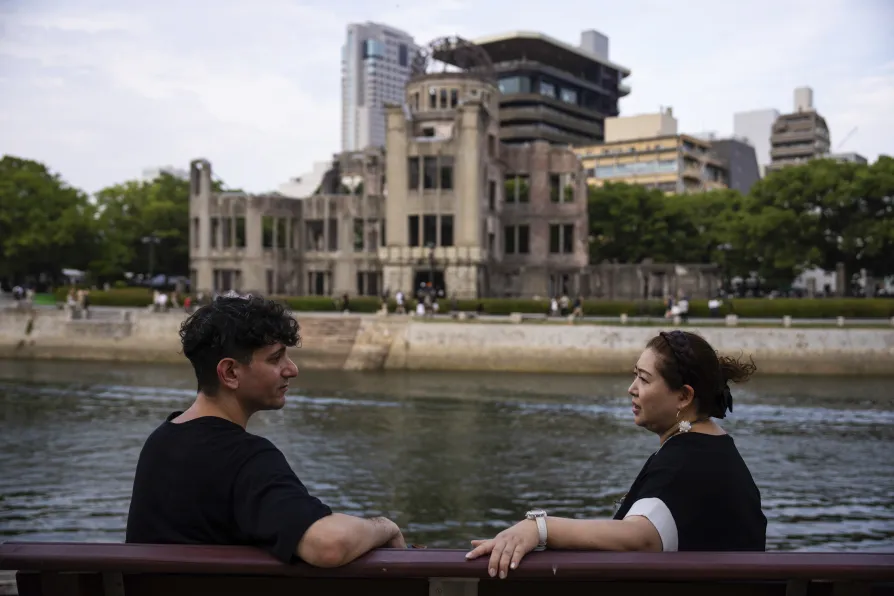As tens of thousands return to the streets for the first national Palestine march of 2026, this movement refuses to be sidelined or silenced, says PETER LEARY
by Mari Yamaguchi

 Ari Beser, left, and Kosuzu Harada, right, chat in Hiroshima
Ari Beser, left, and Kosuzu Harada, right, chat in Hiroshima
WHEN the atomic bombs were dropped on Hiroshima and Nagasaki in August 1945, Ari Beser’s grandfather was on board both of the US B-29 bombers that carried the weapons. On the ground, Kosuzu Harada’s grandfather survived both attacks.
Neither of the men — US radar specialist Jacob Beser and Japanese engineer Tsutomu Yamaguchi — met during their lives. But both became staunch advocates of nuclear disarmament.
Decades later, that shared goal has brought their grandchildren together. Ari Beser and Harada are telling their grandfathers’ linked stories and working to seek reconciliation and understanding about an attack that continues to divide people in both countries.
During this week’s commemoration of the 80th anniversaries of the Hiroshima and Nagasaki attacks, the grandchildren visited a station in Hiroshima where Yamaguchi, badly injured, boarded a train back to his hometown of Nagasaki a day after the August 6, 1945, attack. The two grandchildren then went to the Hiroshima peace park where they spoke with The Associated Press about what their grandfathers experienced during two of the 20th century’s most momentous events and their consequences.
Kosuzu Harada remembers her grandfather as a compassionate advocate for peace.
Yamaguchi was 29 when he was burned severely in the Hiroshima bombing. He was in the city on a temporary assignment as a shipbuilding engineer. After Yamaguchi arrived in Nagasaki, and was telling colleagues about the attack he’d witnessed in Hiroshima, the second bomb exploded.
Harada first learned about her grandfather’s experience of both bombs when she interviewed him for an assignment in primary school.
Yamaguchi didn’t talk about his experience in public until he was 90 because of worries about discrimination. He then became a vocal activist for peace until he died in 2010.
In 2013, Harada learned that the grandson of an American who was on the planes that bombed both Hiroshima and Nagasaki wanted to hear about Yamaguchi’s story.
“I had mixed feelings as a family member of the survivors,” Harada said, recalling Ari Beser’s first visit.
Ari Beser quietly listened as Harada’s mother talked about Yamaguchi.
Harada and her mother were surprised when they learned the senior Beser was exposed to radiation during his missions.
“We used to see ourselves only from the victims’ perspective,” she said. “We learned that war affects and ruins everyone’s lives.”
“I feel it is my role to keep telling about the horror… so that the same mistake will never be repeated,” Harada added.
She tours Japan to talk about her grandfather’s story and to push for a nuclear-free world.
Yamaguchi used to say that he could never forgive the US government for dropping the bombs, but he had no hatred for Americans. Even as his health deteriorated, Yamaguchi still spoke of his past, holding an interview from his hospital bed.
Beser, a visual journalist and producer, has since regularly visited Nagasaki, and he and Harada have become friends.
Harada believes the US government should formally apologise for the bombings.
“A reconciliation takes time. It’s a long process which takes generations,” Harada said.
Ari Beser’s grandfather was considered a hero at schools for his role in the bombings.
When he was asked about the attacks during his first visit to Hiroshima 40 years ago, Jacob Beser did not apologise, but said: “I wouldn’t say it was our proudest moment.” He said the world needed to make sure it doesn’t happen again.
Growing up, Ari Beser was told that his grandfather’s bone cancer was presumably from his radiation exposure during the bombing missions.
In 2011, Ari Beser traveled to Japan for the first time to learn more about the bombings. He has since met many survivors and is eager to hear their stories.
“Before, I think that we all believed in the same justifications. I can’t justify it anymore,” Ari Beser said about the bombings. “For me, all I focus on is trying to convey it to people so that it doesn’t happen again.”
Because his grandfather was on both B-29s, Ari Beser was always interested in meeting a double survivor. That led him to Harada’s family 12 years ago.
“It’s passing the baton and it’s leaving the record… we are the keepers of memory,” Ari Beser said.
He was young when his grandfather died and never got to talk with him about the bombings.
“I also want to interview him or just want to ask him so many questions” and find out if there were other options besides dropping the bomb, he says.
Despite language difficulties, the two grandchildren keep communicating and working together on projects, including a book about their grandfathers.
As the world increasingly becomes a divisive place, with fighting in the Middle East and Ukraine, Ari Beser believes his work with Harada is more important than ever.
“It makes you nervous, makes you worry because if this history repeats with today’s nuclear weapons, it’s almost unimaginable how much would be destroyed,” Ari Beser said.
Visiting Japan and meeting with Harada, he said, “makes me little bit more hopeful… Everybody needs hope and this is how I get hope.”

As we mark the anniversaries of the Hiroshima and Nagasaki bombings, JOHN WIGHT reflects on the enormity of the US decision to drop the atom bombs

Today Coventry’s Hiroshima Day Remembrance marks 80 years since the atomic bomb was dropped in 1945. Statement from Coventry Lord Mayor’s Committee of Peace and Reconciliation

JEREMY CORBYN reports from Hiroshima where he represented CND at the 80th anniversary of the bombing of the city by the US

Ageing survivors of the Hiroshima and Nagasaki atomic bombings are increasingly frustrated by growing nuclear threats by global leaders










